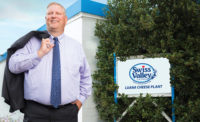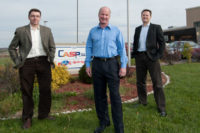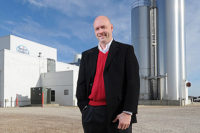Defining and refining the business
Swiss Valley Farms has honed its focus in the past four years by selling and buying assets. In 2008, it started selling its cultured and fluid milk businesses; it was out of the fluid business for good in 2009. Swiss Valley Farms sold a Parmesan packaging facility in Dalbo, Minn., because it wasn’t using any members’ milk. In 2010, it bought Faribault Dairy Co., a maker of blue-veined cheeses, a growing category. That same year, Swiss Valley Farms formed a joint venture with Emmi-Roth Käse USA (called White Hill Cheese Co., LLC) to manufacture cheese in Shullsburg, Wis., where it owns a 24,000-square-foot plant. White Hill Cheese makes Baby Swiss, no-salt-added Swiss and other varieties.
Today, Swiss Valley Farms is a manufacturer of high-value cheeses and whey powders. Efficiency is seen throughout the entire operation. Boelens speaks proudly about his “lean operation.” The Davenport headquarters is in a building shared with other businesses. There are just six people on the executive staff, and when Saforek adds there is not a “plethora” of resources, he means layers of management. “You can’t hide here,” he says. Everyone has to add value, he adds.
“As a midsize company, we play the innovation card,” Boelens says. He also puts the focus on the customer. “We provide a high level of service.” Boelens met with every major customer and asked them: What can we do to make your business better? Then he figured out how to work within the parameters of cost, functionality and nutrition.
Cropp says that is exactly what a co-op needs to do. The key to success, he says, is to build relationships with customers and work with them on product development.
Investing in IT, plants
Information technology is vital for any business. Swiss Valley Farms has networked its plants and connected them to headquarters. It purchased a demand-planning system to replace Excel-based spreadsheets. The new software allows the company to generate forecasts for sales, marketing, logistics and financials. Boelens says the company “probably gained 10 years” in a three-year span by converting to the demand-planning software.
Infrastructure investments at the plant level include an ultra-filtration unit, milk receiving improvements and air handling upgrades. The raw milk UF separator unit improves milk by adjusting to seasonal variations in a cow’s milk production, thus allowing for the manufacturing of a more consistent product. (Read more about Swiss Valley Farms’ Luana cheese manufacturing plant on page 60.) That one piece of equipment is important. For a cheesemaker, the hardest thing to do is be consistent, says Jirik. He should know. He’s a master cheesemaker and board member of the American Cheese Society.
Jirik takes pride in the fact that Swiss Valley Farms makes specialty Swiss-style cheeses, not commodity products. He describes his cheese as “high flavor” and calls it world championship caliber. That’s not just hype. The company is recognized every year in cheese competitions. The ones that mean the most are those judging a cheese’s technical merits, although the company appreciates awards given for taste and appearance.
Compared to Swiss cheese, making Cheddar is easy, Jirik says. “We have to wait 55-60 days to see if we’ve done it right,” he adds, referring to the taste, eye formation and other factors that define high-quality Swiss and Emmenthal cheeses.











